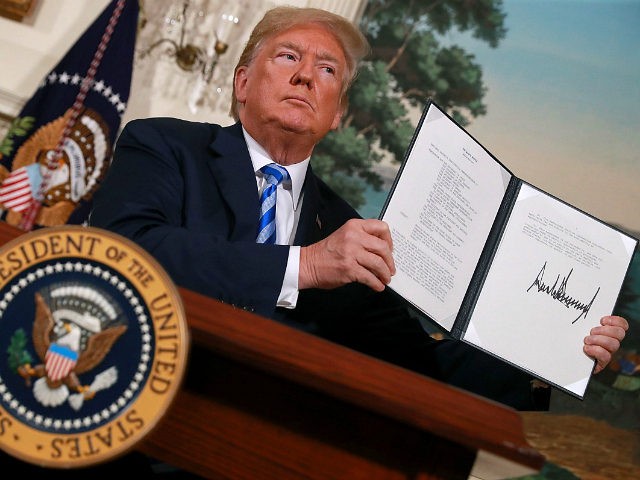WASHINGTON, DC — Some opponents and proponents of the Iran nuclear deal who served under various administrations admitted to a House panel on Tuesday that the pact is “deeply flawed” but urged U.S. President Donald Trump to try to “fix” the problems rather than withdraw from the agreement.
For President Trump, who urged Congress to “fix” the deal months ago, the time to act has expired. The last-minute bipartisan attempt by the former U.S. officials to convince Trump to keep the Iran deal fell on deaf ears.
The former U.S. officials testified before the Republican-led House Foreign Affairs Committee on Tuesday, hours before President Trump decided to re-impose sanctions lifted under the deal, a move that the White House described as “terminating the United States’ participation in the Joint Comprehensive Plan of Action (JCPOA),” the pact’s official name.
In a May 8 memo to the leaders of his administration, President Trump explained, “I made clear … that absent an understanding to fix the JCPOA, the United States would not continue to implement it. That understanding has not materialized, and I am today making good on my pledge to end the participation of the United States in the JCPOA.”
The House panel witnesses failed to convince the administration to allow more time for finding ways to mend the agreement.
Former Ambassador Lincoln P. Bloomfield Jr., the chairman of the non-partisan Stimson Center who held various under five Republican administrations, told lawmakers via written testimony:
I have concluded that those who see merit in maintaining the restraints on Iran’s nuclear program under the Joint Comprehensive Plan of Action, and those – including the President – who believe that Iran poses serious threats to our interests that are not addressed by the existing accord, are both right. Both points of view can be accommodated, if the Congress is prepared to act.
…
I share the President’s concerns about Iran but respectfully submit that withdrawal from the JCPOA is neither the only nor the best way to address them.
He urged the president to work with Congress to ensure that the deal addresses the ongoing menace posed by state-sponsor of terror Iran.
Stephen Rademaker, a lawyer at Covington and Burling who served as a top State Department official, maintained in his written remarks:
It will not surprise you to hear that my views have not changed and I continue to believe that the JCPOA was deeply flawed.
…
For far too long, supporters of the JCPOA have blithely asserted that the agreement “cuts off all of Iran’s pathways to a bomb,” without including the essential qualification that this is only true for the first 10-15 years of the agreement.
He went on to urge to Trump administration to stick to the agreement despite the plethora of problems withing accord, telling lawmakers:
The recognition that the JCPOA has embedded within it very serious flaws does not lead to the conclusion that we should abandon the agreement today. Doing that would threaten to turn the long-term problem of the sunset clauses–a problem which will mature in January 2026, ten years after the agreement entered into force–into an immediate problem.
Rademaker called on Congress to “fix” the deal and avert an immediate exit from the pact.
Jane Harman, a former Democratic member of Congress who now serves as the president of the Woodrow Wilson International Center for Scholars, also pleaded with the Trump administration not to withdraw from the agreement, echoing current lawmakers from her party.
Harman testified:
While the deal isn’t perfect and was only transactional, it’s better than no deal and has enormous impact on any future deal the Administration hopes to make. Many hoped the deal could be transformational, but they were wrong. We should admit it and move forward with additional strategies to deter and punish Iran’s malign activity outside the so-called “four corners” of the deal. Plus, the cat’s out of the bag; Iran already possesses the technological know-how.
Finally, if we withdraw from the deal, Iran could – and has said they will – withdraw too.
She urged the Trump administration and Congress to “improve” the agreement.
President Trump kept his campaign promise to end America’s participation in the agreement, reached between Tehran and United States-led world powers — Russia, China, the U.K., France, and Germany— under the Obama administration.
Trump has decided to take a different path, announcing in the May 8 memo, “As President, I have approved an integrated strategy for Iran that includes the strategic objective of denying Iran all paths to a nuclear weapon.”
“Some believed the JCPOA would moderate Iran’s behavior. Since the JCPOA’s inception, however, Iran has only escalated its destabilizing activities in the surrounding region,” the president further explained.

COMMENTS
Please let us know if you're having issues with commenting.